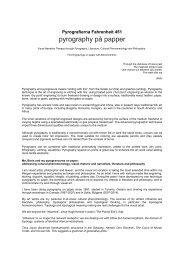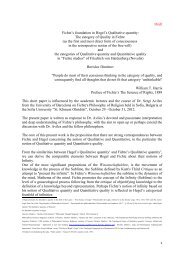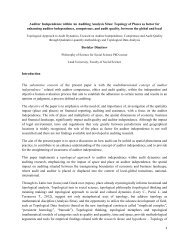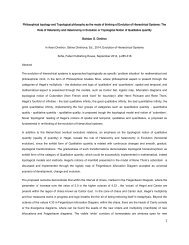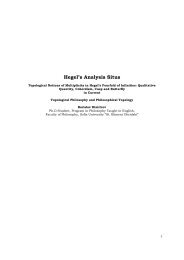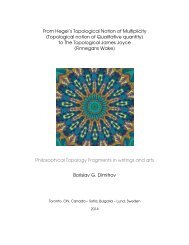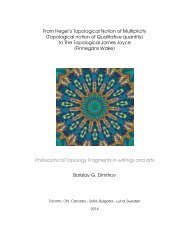Topological Ontology and Logic of Qualitative quantity
Qualitative quantity and BFO (Basic Formal Ontology) of /Barry Smith/ and YAMATO (Yet Another More Advanced Top-level Ontology) of /Riichiro Mizoguchi/
Qualitative quantity and BFO (Basic Formal Ontology) of /Barry Smith/ and YAMATO (Yet Another More Advanced Top-level Ontology) of /Riichiro Mizoguchi/
- No tags were found...
Create successful ePaper yourself
Turn your PDF publications into a flip-book with our unique Google optimized e-Paper software.
This is not to say, however, that this new unified, "affirmative" infinite will suffice on its<br />
own either. It is only in the very process that we have been trying to elaborate here that the<br />
so-called "true" infinite emerges. After rehearsing the ''double meaning" that the finite had<br />
acquired in the foregoing explication (i.e., that it is both finite <strong>and</strong> infinite at the same time),<br />
Hegel explains that The infinite, too, has the double meaning <strong>of</strong> being [first] one <strong>of</strong> these<br />
two momentsas such it is the spurious infinite<strong>and</strong> [second] also the infinite in which both,<br />
the finite <strong>and</strong> its other, are only moments. The infinite, therefore, as now before us is, in<br />
fact, the process in which it is deposed to being only one <strong>of</strong> its determinations, the opposite<br />
<strong>of</strong> the finite, <strong>and</strong> so to being itself only one <strong>of</strong> the finites, <strong>and</strong> then raising this its difference<br />
from itself into the affirmation <strong>of</strong> itself <strong>and</strong> through this mediation becoming the true<br />
infinite.” 99<br />
Coltman concludes that „the true infinite, then, is neither the spurious infinite nor the<br />
affirmative infinite alone, but the process itself in which the former mediates its own<br />
transition into the latter. And, as such, the true infinite shows itself to be a further<br />
determination <strong>of</strong> becoming.”<br />
Coltman closes the circle <strong>of</strong> his discussion going back from Hegel to Gadamer:<br />
“Even in such a brief sketch we can see that in the one-sided logic that constitutes the<br />
alternation <strong>of</strong> the finite <strong>and</strong> the infinite, back <strong>and</strong> forth "on to infinity," the underst<strong>and</strong>ing<br />
tries (<strong>and</strong> fails) to arrest the movement <strong>of</strong> the concept which, if allowed to unfold in terms<br />
<strong>of</strong> its own dialectical Auslegung, logically sublates itself in the infinite. Thus from the<br />
perspective <strong>of</strong> the "<strong>Logic</strong> <strong>of</strong> Being," Gadamer's insistence on a "simple limit" to human<br />
experience appears to be merely an artifact <strong>of</strong> the perspective <strong>of</strong> external reflection. But we<br />
must remember that, although (as with Hegel) reflexive thinking per se is problematic for<br />
Gadamer, it makes no sense to speak <strong>of</strong> it as "external." External to what Reason But<br />
ins<strong>of</strong>ar as language is at least the medium <strong>of</strong> both reflection <strong>and</strong> speculative reason, this<br />
seems to imply that language itself is "external" to reason. But reason, Gadamer would say,<br />
depends on language just as much as the underst<strong>and</strong>ing does. This is not to denigrate reason<br />
as such, but against the transcendental philosophy <strong>of</strong> the Enlightenmentwhich both Hegel<br />
<strong>and</strong> Gadamer criticize, <strong>and</strong> which claims a certain degree <strong>of</strong> independence from the words<br />
through which it is expressed Gadamer wants to reassert the universality <strong>of</strong> language..”<br />
(Gadamer’s “Language is the language <strong>of</strong> reason itself”) 100<br />
We should return to the issue <strong>of</strong> the use <strong>and</strong> the topological meaning <strong>of</strong> "die Mitte" in Hegel<br />
<strong>and</strong> Gadamer, following Coltman’s discussion <strong>and</strong> focusing this issue on the Gadamerien<br />
finitude <strong>and</strong> Hegelian infinity.<br />
For Gadamer the issue <strong>of</strong> human finitude is related with <strong>and</strong> embedded in the language. In<br />
the opening paragraphs <strong>of</strong> "The Middle <strong>of</strong> Language <strong>and</strong> its Speculative Structure,"<br />
Gadamer reiterates two primary moments in the development <strong>of</strong> philosophical<br />
hermeneutics: namely, that "the alldetermining ground [<strong>of</strong> the hermeneutic phenomenon] is<br />
the finitude <strong>of</strong> our historical experience" <strong>and</strong> that "language is the mark <strong>of</strong> human finitude."<br />
Hegel’s notion <strong>of</strong> "die Mitte", Gadamer develops in the language <strong>and</strong> dialoque.<br />
Coltman points out that:<br />
“We see (here) a striking difference from Hegel's usual employment, in the <strong>Logic</strong>, <strong>of</strong> "die<br />
Mitte" as the logical "middle term" between two polar "extremes" that allows for the<br />
sublation <strong>of</strong> these opposites. Of course, as we have already pointed out, Gadamer is<br />
speaking here <strong>of</strong> what he will call "dialectic" as it occurs in living dialogue between two<br />
99<br />
Hegel's Science <strong>of</strong> <strong>Logic</strong>, trans. A. V. Miller, trans., Atlantic Highl<strong>and</strong>s: Humanities, 1990.<br />
Original German Text: Wissenschaft der Logik I, Frankfurt: Suhrkamp Verlag, 1970., 148.<br />
100<br />
Rod Coltman, The Language <strong>of</strong> Hermeneutics, Gadamer <strong>and</strong> Heidegger in Dialogue, p.99-<br />
101<br />
41





